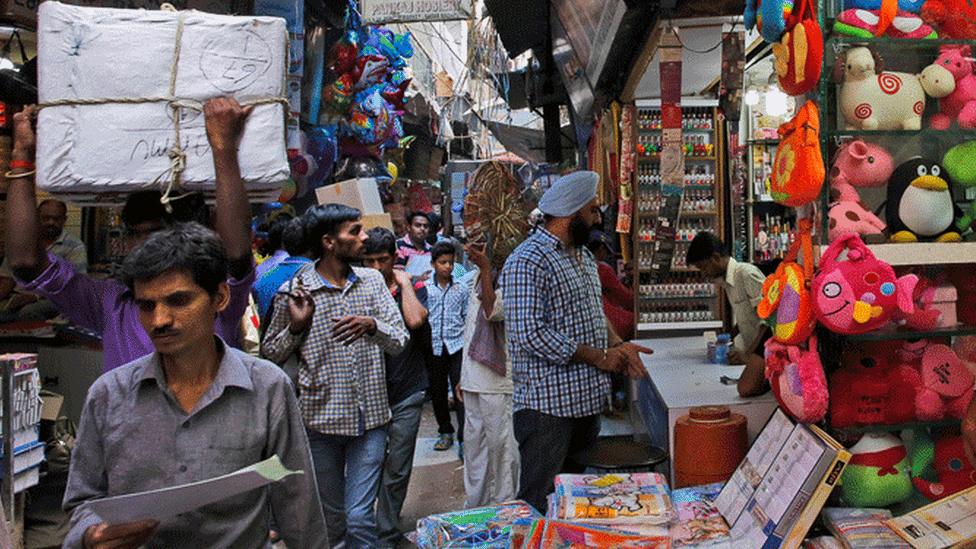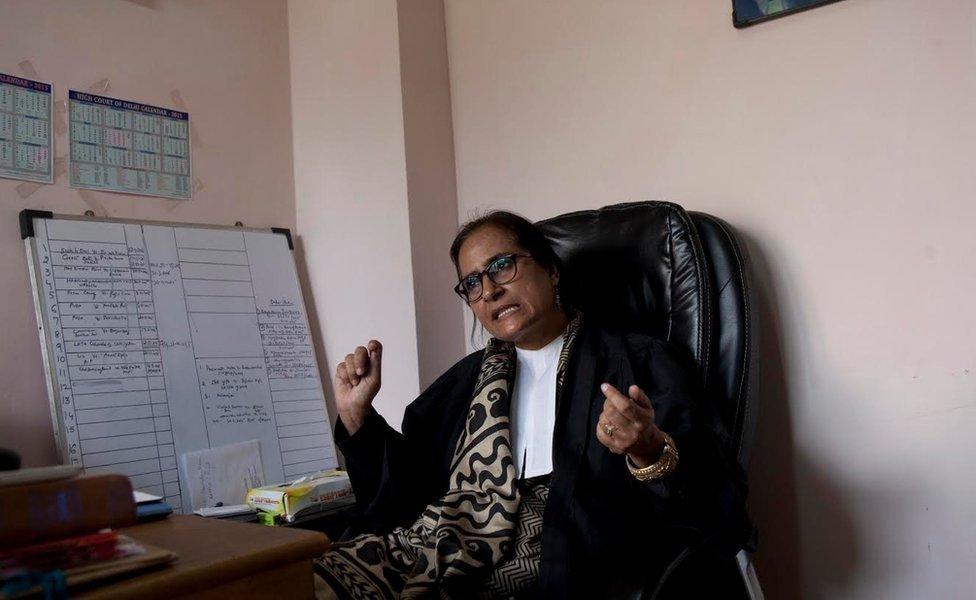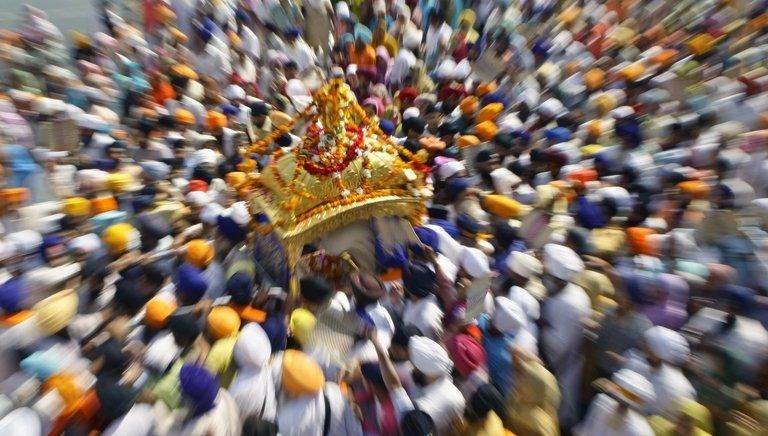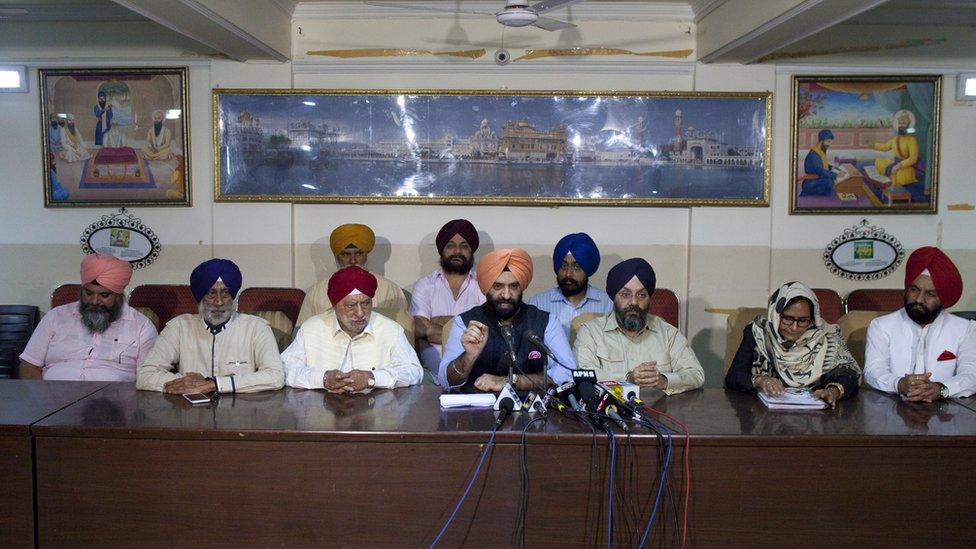Should making fun of Sikhs be banned?
- Published

Nobody quite knows when Sikh jokes became a part of pan-Indian humour
A Sikh man calls up a doctor.
"Doctor my wife is pregnant. She is having pain right now," he says.
"Is this her first child," asks the doctor.
"No, this is her husband speaking," answers the man.
Many would find this a rather lame and harmless joke, but this is exactly what gets Harvinder Chowdhury's goat.
This is also one among the 60-odd gags that the feisty 54-year-old Delhi-based Sikh lawyer has submitted to the Supreme Court, while seeking a ban on jokes involving her 20-million-strong community.
In an unprecedented plea to the top court last week, Ms Chowdhury, herself a lawyer for the past three decades, says that there are 5,000 websites which sell jokes "projecting Sikhs as unintelligent, stupid, idiot, foolish naive, inept, not well versed with English language and as symbols of stupidity and foolishness".
'Casual comic'
These jokes, she says "violate the fundamental right to life and to live with dignity", and so the sites carrying them should be banned.
The puzzled judges, while agreeing to hear the rather dire plea, wondered why she sought such a ban.
"Many people we know take these jokes sportingly, external. It may not be an insult but only some casual comic statement for amusement. You want all such jokes to stop but Sikhs may themselves oppose it," said the judges.
But sitting in her poky room in a warren of lawyer's chambers near the Supreme Court in Delhi, Ms Chowdhury says she's not willing to take these "insults" lying down any longer.

Harvinder Chowdhury says the jokes are racist and have to go
"Enough is enough. We Sikhs have endured a lifetime of mockery. My children want to drop their Sikh surnames because they face a lot of ridicule. When I protest against this, people say I am a Sikh woman, so I must be mad," says an agitated Ms Chowdhury.
"The jokes are the bane of Sikhs. They have to go."
Ms Chowdhury - who says she studied law in the UK and worked as a cab driver, samosa maker and at a Kentucky Fried Chicken outlet during her time there - conflates the "racism, hatred and sexual harassment" that she has faced as a woman with the jokes targeting the Sikh community. She also says her family was targeted during the 1984 anti-Sikh riots in Delhi, where more than 2,000 people died.

Sikh jokes
Sikh on phone: Doctor my wife is pregnant. She is having pain right now. Doctor: Is this her first child? Sardar: No this is her husband speaking.
Sikh: How much is my mobile bill? Call centre: Sir, just dial 123 to know current bill status. Sikh: Stupid, not current bill, my mobile bill.
Sikh to his servant: Go and water the plants. Servant: It is already raining. Sikh: So what, take an umbrella and go.
Teacher: What are prehistoric monsters called when they sleep. Sikh: A dinosnore!
Teacher: What language do they speak in Cuba? Sikh: Cubic.
Boss: Where were you born? Sikh: India. Boss: Which part? Sikh: What which part? Whole body was born in India.
Interviewer: What is your birth date? Sikh: 13 October. Interviewer: Which year? Sikh: Every year.
(Source: Harvinder Chowdhury's petition in the Supreme Court)

"I have fought with fellow lawyers in the courts for making fun of Sikhs. I have slapped people who have cracked Sikh jokes at my expense. I know of a newly married Sikh couple who were hurt because somebody presented them with a Sikh joke book at their wedding."
Now she's marshalling her forces to persuade the judges that she has a watertight case for a ban: a Sikh MP has supported her ban, and a college in Punjab has joined the issue and petitioned the court. Sikhs have begun visiting her at her chamber and the main group that looks after Sikh temples in Delhi have offered her support.
Ms Chowdhury has also shot off letters to school principals requesting them to give "counselling to children to stop enjoying and spreading [Sikh] jokes".
One Sikh commentator wrote that he supported the ban, external because "India needs to grow up and stop being the kid at the dinner table listening wide-eyed to and laughing at crassness. It needs to stop despite the fact that we all hold free speech dear".

India has more than 20 million Sikhs
This is not the first time Sikh jokes have been under pressure.
In 2007, police registered a case against leading businessman Anil Ambani for circulating jokes , external"insulting" the Sikh community, when a Sikh leader in Uttar Pradesh blamed his mobile-telephone company for the text-messaged jokes. The company which circulated the jokes apologised. The same year a bookseller was arrested in Mumbai for selling Sikh joke books and "hurting religious sentiments".
Many believe Sikh jokes, like all jokes playing on stereotypes and comedy about one's race, are harmless fun. There are jokes about the Italians, the Polish and the English, and in India, there are plenty of gags which play around stereotypes such as Bengalis, for example. (One Bengali is a poet, Two Bengalis are a film society, Three Bengalis are a political party, Four Bengalis are two political parties.)
Nobody quite knows when Sikh jokes became a part of pan-Indian humour, but Sikh joke books - many written by Sikhs themselves, and a few by India's best-known Sikh writer Khushwant Singh - have been available for a long time.
With the advent of the internet and smart phones, Sikh jokes have become a veritable industry, with joke factories around India, external writing and selling them on phones. Most feature two fictional characters, Santa and Banta - and their funny, and sometimes, tasteless, gabfest.

A group which looks after Sikh temples in Delhi has supported the move for a ban
India's Sikh community - despite being targeted in one of the worst riots in post-Independence India which left it with deep psychological scars - is among its most successful minorities. Hardworking and entrepreneurial, they dominate the armed forces and make successful businesspeople, sportspeople and farmers. They travel widely and work and thrive all over the world.
Jawaharlal Handoo, who has written extensively on Indian folklore, suspects that the success story of Sikhs may have bred anxiety among non-Sikhs. "I suspect this may have threatened the Hindu ego and created an anxiety which in turn seems to have taken the form of various stereotypes and the resultant joke cycle."
Sociologist Shiv Visvanathan echoes a similar sentiment, but believes most of the stereotypes involving the Sikhs brim with naivete and are "friendly, even playful". The jokes have spread, he believes, because the community is migratory, mobile and ready to work in diverse professions.
"Stereotypes cannot be equated with identity. But the problem these days is that identity has become a fetish. People have become touchier. So there are more demands for bans," says Mr Visvanathan.
Tell that to Ms Chowdhury and she flies into a bout of mild rage.
"These jokes are racist. Everybody seems to be having fun at the expense of our community. This is unacceptable, this has to go."
That's clearly not a joke.